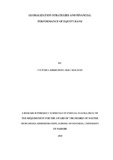| dc.description.abstract | This study was based on globalization strategies and financial performance at Equity
Bank. Specifically, the study sought to establish globalization strategies that Equity
Bank uses, and to determine the impact of the strategies on Equity Bank’s financial
performance. Study was guided by the following questions; which globalization
strategies does Equity Bank use? What implications do globalization strategies have on
Equity Bank’s financial performance? To establish the relationship between
globalization and financial performance, the study used resource-based view theory and
new trade theory. Independent variables included joint venture, partnership, whollyowned
entry mode, strategic alliance, franchising, mergers and acquisition, outsourcing
and licensing as globalization strategies. The dependent variable included revenue and
profit margins, share earnings and market position as financial performance. The study
adopted a case research design. Equity Bank headquarter served as the data point.
Secondary and primary data was collected from a target of 6 senior bank manager using
an interview guide and a study guide. Data analysis was done by use of content analysis
technique. Out of the six (6) target respondents the study managed to get engage five
(5), giving a response rate of 83 %. From responses, it was established that out of the
eight (8) globalization strategies that were under observation, the bank used six of them;
excluding licensing and franchising. The six duly used globalization strategies were
also categorised into two different dimensions. The first one indicates mergers and
acquisition and wholly-owned strategies which are used by the bank in moving physical
operations across border. The rest which include joint venture, partnership, strategic
alliance and outsourcing were found to be used in enhancing the instituting and
operationalization of the bank in the foreign markets. Financial performance of the bank
was found to be in ascending graph at an average profit growth rate of 8%. Due to the
economies of scale that the Bank gains from international expansion, total operating
costs were found to reduce at an average of 4%. The ranking of the bank were also
found to commensurate its revenue and profit performance. The bank ranked at position
799 globally and 35th in terms of soundness, 44th in terms of return on equity and 8th in
return on assets. Locally, the bank is at position three on general ranking with best retail
banking. The study concludes that there is a strong positive relationship between
globalization strategies and financial performance at Equity Bank. The study therefore
recommends that globalization and globalization strategies be adopted by other banks.
Limitation of the study include the focus on Equity Bank alone, yet the banking industry
in Kenya is made of 43 banks, of which quite a number are operating across local
borders. The study further recommends furtherance of this study to include all
commercial banks in Kenya that are operating in international markets. | en_US |



